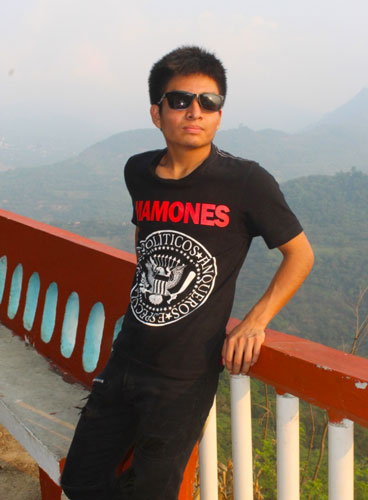Winning Piece in the Category of Short Story of the 1st Prize for Literary Creation in Indigenous Languages, "Gusanos de la Memoria 2020"
Translated by Paul M. Worley and Melissa D. Birkhofer

Gaudencio Lucas Juárez (2003) I was born in Tuxtla, Zapotitlán de Méndez, Puebla. I like to write poetry and stories in Tutunakú. I’m in my fourth semester of my baccalaureate program at the school “Manuel Ávila Camacho,” where I play bass in the Tuntunakú ensemble.
Prize Winner in the short story category (English/Tutunakú/Spanish)
Pulkincio and Kiwikgolo’
Pulkincio, a short, hard-working man, lived alone with his daughter after his wife had died in childbirth. Early one April morning when the moon still lit up the small drops of dew, Pulkincio heard someone knock on his door. He got up and, looking through a small hole on the door, could see an owl with horns, fiery eyes, and a mouth full of worms. The owl was singing and dancing around a tooth. He turned around and smiled at Pulkincio, who then woke up, shaking. It had just been a nightmare.
As the darkness was barely fading among the first rays of sun, Pulkincio went out to the woods where there were caves and enormous rocks, where he hoped to find Kiwikgolo’ (god of the forest) and ask him about his dream. When he got to a dark place in the woods he began to call out, “Kiwikgolo’! Kiwikgolo’!” But no one responded. So he kept on walking to a darker place where he found a giant stone tower, and he called out again, “Kiwikgolo’! Kiwikgolo’!” He heard footsteps from inside the tower like someone was coming down stairs. The door opened and an old, well-built man wearing a straw hat came out. Pulkincio knew that he was now before Kiwikgolo’, so he got on his knees and began to tell him about the nightmare.
“Your nightmare is announcing the death of your daughter,” said Kiwikgolo’.
Pulkincio looked at the ground and began to cry softly. Kiwikgolo’ took pity on him, and said, “Let’s make a deal. We’ll play ‘tsum.’ If you win your daughter won’t die, and I’ll give you the treasure I have in my tower. But if you lose you’ll grow horns and a tail like a dog. You’ll sprout hair all over your body, and you’ll have to be my servant.”
Sweating, Pulkincio sadly replied, “I don’t know how to play.”
He then asked if they could play something else, at which Kiwikgolo’ smiled and, drawing on his cigar, said, “That’s fine. Let’s go in my tower and we’ll go up to the belfry. If you can play the bells better than I can I’ll be true to my word, but if I play better than you, you already know what will happen.”
Since he loved his little daughter a lot, Pulkincio had no other option than to accept. They went inside and climbed up to the belfry, where there were two gold bells that had a beautiful sound. Pulkincio asked, “How will we know who the better player is?”
“When the most beautiful notes ring out the sun will be surrounded by a halo, and when the lesser ones sound the sun will be clouded over and it will rain,” explained Kiwikgolo’.
Kiwikgolo’ started playing first, and he played so beautifully that the orchids all quickly bloomed and the sun was soon surrounded by a halo.
“It’s your turn,” said Kiwikgolo’.
Pulkincio took the bells and began to play, playing so beautifully that the stars came out and the sun was surrounded by an even more beautiful halo. Pulkincio felt better. He played even louder, being careful not to break the bells. The sun became cloudy, the stars became lightning, and a heavy rain began to fall.
When Pulkincio realized what he had done, he ran out of the tower and went straight home. When he got there, he noticed a number of people were inside. His daughter had suffocated and lay stretched out, dead on a straw mat. Pulkincio felt a dog’s tail beginning to sprout from his body, and two enormous horns emerging from his head.
Original version in Tutunakú
Pulkincio chu Kiwikgolo’
Pulkincio xwanikan chatum aktsu chixcku’ cha xaskuni´, man xtsumat xtawi tiku xakgkutum kat xkgalhi, xlakata tinilh xpuskat akxni ti lakgtaxtulh. Makgtum tsisni´ laa abril, akxni papa´ xlakgmakgskgoma monkganat, tikgaxmatlh Pulkincio pi winti xlakgatlakgma xmalakch, laktalakaxtulh tani xlakalhukun xmalach chu stalanka úkxilh tantum mumu nima xkgalhiy xakgalokgot, xla lhkuyat xkgalhiy xlakgastap chu xlitsamay laktsu chakalh xkgalhchup, uma mumu xlakgatantlima chu xtlinima kgantum xwatitatsan, akxni talakgaspitlh kixit lakawa chu lhpipakg lakgawa Pulkincio, paks kaa xlimanixninit.
kaakuwa spalhalha xkawama, takilhanulh Pulkincio kkakiwin tani xwilakgolh lhuku´chu luwa’ kasipinita´, xlakata xtatanokglhputun Kiwikgolo’, xkgalaskilh chi tuku xliwankan luuwa kalakawa xmanixninit.
Akxni lakapulh tani kgapokglhwata xwanit tsukulh xekgnan “Kiwikgolo’, Kiwikgolo’”, cha tini kgalhtinalh tsa ancha´ tani tlakg kgapokglhwata xwanit chu lakgatakgslh akgtum putlakgnasipi, xekgnampa amakgtum “Kiwikgolo’, Kiwikgolo’”. Anta kxpulakni putlakgnasipi takgaxmatlh pi winti xputaktamach litokgotno´talajkilh xamalakch chuwa taxtuch chatum kgolo’ luuwa lanka´, lhkgokgolo’ chu xlasakgat xakgpakgat, katsilh tunkan Pulkincio pi kxlakatin Kiwikgolo’ xyaa,
Tatsokgostanilh chu lixakgatlilh xtamanixni’.
Mintamanixnit lakawaniy pi naniy mintsumat -wanilh Kiwikgolo’, Pulkincio takilhputalh chu pistsu tasalh, kgaya katsanilh Kiwikgolo’ chu nama wanilh:
Kalajkaxlaw, kakgamanaw xla “tsum” wala pi nakintlajaya´ni katinilh mintsumat chu naktakiyan kintumin tuku kmatsekgnit kxpulakni uma putlakgnasipi, chanchu pi naktlajayan naniy mintsumat chi wixinchu nastakniyan mi’akgalokgot, mistaján chu mimakchixit, chuwa kilakskuni nawana´.
Xlipuwanit chu kxunuma Pulkincio laa kgalhtinalh: nijkatsiy jkgamanan wan, chu skilh akgtum talakgalhaman pi tanu tu xlalitlajakgolh, chachu kiwikgolo´litsilh, xkulilh xaxkut chu aya wan:
Tlan, champi katanuw jkimputlakgnasipi chu natawakayaw tani wakakgocha litlakgna´, wala pi tlakg stlan natlakgnana’ lala kit nakmakgantaxtiy kintachuwin chanchu pi kit tlakg stlan naktlakgnan, katsiyatá tu nalay. Pulkincio lakaskilh xlakata nalhla tu xtlaway chu likwa xlakgkatsan aktsu xtsumat.
Tanukgolh chu tawakakgolh, lakapulhkgolh tani xwakakgol akgtuy litlakgna’ xalakslipwa’ chuwa luuwa stlan xmakawankgoy, pulkincio kgalaskininalh: ¿Lala chu nakatsiyaw tiku tlakg stlan na tlakgnan? Akxni natakgaxmat tlakg xastlan tatlakgni´wa chichini´nalitakgstilinuy xchiki´chanchu la namakawan tlakg xakalakawa tatlakgni´ natalakgapokglh chichini´ chuwa nasinan – wan Kiwikgolo’. Pulana tsukulh tlakgnan Kiwikgolo’, luuwa stlan tlakgnalh lapi kapala lixanakgolh tsinkalapatux chu litakgstilinulh xchiki’ chichini’, wixa lakgtchanan wan Kiwikgolo’.
Pulkincio lakatikgolh litlakgna’ chu tsukulh tlakgnan, tlakg stlan tlakgnalh lapi staku´ lakgtalakaxtukgolh chu chichini´ tlakg xalhtalankga litakgstilinulh xchiki’.Litatlankanilh Pulkincio, tlakg litliwakg tsukulh tlakgnan lapi ni likatsiy laa lakgpakglh litlakgna’. Talakgapokglh chichini´, makgalipit wankgolh staku chu tataktakgolh lanka sin.
Akxni úkxilh tuku xtlawanit takgoson taxtuchá kputlakgnasipi chu alh kxchik´.
Akxni tayacha’ kxlakatin xchik´ úkxilh pi likwa xtsamawilakgoka kxpulakni´, anta´ kxtikat xmaa xtsumat xanín. Anta kxmakni Pulkincio kgantum kstajan chichi´ kstaknima chu kxakgxakg kgantuy laklanka´ akgalokgot.
Spanish translation
Pulkincio y Kiwikgolo’
Pulkincio, un hombre chaparro y trabajador, vivía con su hija de once años, su esposa había fallecido después de dar a Luz. En una madrugada de abril cuando la luna alumbraba las pequeñas gotas de rocío, Pulkincio escuchó que alguien tocaba la puerta, él se asomó a través de un pequeño agujero de la puerta y pudo distinguir a un búho con cuernos, ojos de fuego y un pico lleno de pequeños gusanos, éste búho cantaba y danzaba alrededor de una muela, al voltear sonrió y Pulkincio despertó temblando. Todo era una pesadilla.
Apenas la obscuridad se desvanecía entre los primeros rayos del sol, Pulkincio se encaminó al bosque donde habían cuevas y enormes rocas, quería encontrarse con Kiwikgolo’ (Dios del monte) para preguntarle por qué había tenido esa pesadilla. Al llegar a un lugar donde ya había obscuridad comenzó a gritar, ¡Kiwikgolo’!, ¡Kiwikgolo’!, pero nadie respondió. Entonces fue a un lugar más oscuro y encontró una enorme torre de piedra y gritó de nuevo ¡Kiwikgolo’!, ¡Kiwikgolo’!. Dentro de la torre se escuchó unos pasos como si bajaran de unos escalones, se abrió la puerta y salió un anciano alto, musculoso y con sombrero de pasto. Pulkincio supo que ahora estaba frente a Kiwikgolo’, entonces se arrodilló y le platicó sobre la pesadilla que había tenido.
_Tu pesadilla anuncia la muerte de tu hija_ dijo Kiwikgolo’.
Pulkincio bajó la mirada al suelo y lloró en voz baja. Kiwikgolo’ tuvo piedad por él y entonces le dijo.
_Hagamos un trato, vamos a jugar “tsum” si tu ganas tu hija no morirá, además te daré mi tesoro que oculto en esta torre pero si pierdes tu hija morirá y a ti te saldrán cuernos, rabo de perro y crecerá vello en todo tu cuerpo, además serás mi sirviente.
Pulkincio triste y con el rostro sudado respondió:
_No sé jugar_. Y pidió otra oportunidad para que compitieran en otra cosa y entonces Kiwikgolo’ sonrió, fumó su tabaco y luego dijo:
_ Está bien, entonces entremos a mi torre y subiremos hasta el campanario, si tú tocas más hermoso que yo entonces cumpliré mi palabra pero si yo toco más hermoso que tú ya sabes lo que sucederá.
Pulkincio no tuvo otra opción más que aceptar, pues quería mucho a su pequeña hija. Entraron y subieron, llegaron donde habían dos campanas de oro y sonaban muy bien, Pulkincio preguntó:
_¿Y cómo sabremos quien toca mejor?_
_ Cuando se escuche la tonada más hermosa el sol va a ser rodeado por un halo y cuando se escuche la tonada más fea el sol será nublado y lloverá_ explicó Kiwikgolo’.
Primero comenzó a tocar Kiwikgoló, tocó tan bonito que las orquídeas florecieron rápidamente y el sol fue rodeado por un halo.
_ Es tu turno_ dijo Kiwikgolo’.
Pulkincio agarró las campanas y empezó a tocar, tocó aún más hermoso que las estrellas se asomaron y el sol fue rodeado por un halo más brillante. Pulkincio se sintió el mejor. Tocó aún más fuerte que sin querer rompió las campanas. El sol fue nublado, las estrellas se convirtieron en rayos y cayeron acompañados por una fuerte lluvia.
Al darse cuenta de lo que había hecho, salió corriendo de la torre y se dirigió a su casa. Cuando llegó, vio que había mucha gente adentro. En el petate yacía su hija muerta por asfixia. En el cuerpo de Pulkincio un rabo de perro comenzaba a crecer y en la cabeza unos enormes cuernos.
Reading of the short story in Gaudencio Lucas Juárez's own voice found here: https://www.youtube.com/watch?v=nB1TfXN00ys
The jury was comprised of the Chiapanecan writer Balam Rodrigo and the Mazahua writer Susana Bautista Cruz.
About this piece:
Written in Tutunakú and Spanish, the short story “Pulkincio chu Kiwikgolo’” possesses a certain beauty, fluidity, and even a soberness. Reflected in the decision to leave the title in Tutunakú, the story recreates oral tradition, myths, and legends, to produce a written, fictionalized account of daily life in which the supernatural, duality, and people-animals emerge victorious.



